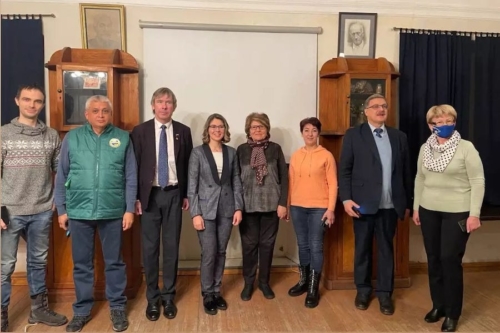
 In the laboratory building of the Apothecary Garden, the oldest botanical garden in Russia, founded by Peter I, a working meeting of representatives of the Moscow city government from the United Russia party took place. The topic of the meeting was “The latest technologies for the care and improvement of the urban environment, taking into account the natural features of the local flora and fauna.” The meeting was attended by the permanent director of the Botanical Garden of Moscow State University “Apothecary Garden” since 1993, Chairman of the Board of the “Association for the Development of City Parks and Public Spaces of Russia”, Vice-President of the oldest scientific society in Russia, the Moscow Society of Natural Scientists (MOIP) Alexey Aleksandrovich Reteum. Alexey Aleksandrovich presented a report on the technologies used in the construction of the Moscow State University Botanical Garden, located almost in the center of the historical part of Moscow, and the truly outstanding results obtained in growing and breeding plants, arranging paths with a natural covering of bark and a system for collecting water from the pitched roofs of park buildings and constantly used for self-sufficiency of the garden.
In the laboratory building of the Apothecary Garden, the oldest botanical garden in Russia, founded by Peter I, a working meeting of representatives of the Moscow city government from the United Russia party took place. The topic of the meeting was “The latest technologies for the care and improvement of the urban environment, taking into account the natural features of the local flora and fauna.” The meeting was attended by the permanent director of the Botanical Garden of Moscow State University “Apothecary Garden” since 1993, Chairman of the Board of the “Association for the Development of City Parks and Public Spaces of Russia”, Vice-President of the oldest scientific society in Russia, the Moscow Society of Natural Scientists (MOIP) Alexey Aleksandrovich Reteum. Alexey Aleksandrovich presented a report on the technologies used in the construction of the Moscow State University Botanical Garden, located almost in the center of the historical part of Moscow, and the truly outstanding results obtained in growing and breeding plants, arranging paths with a natural covering of bark and a system for collecting water from the pitched roofs of park buildings and constantly used for self-sufficiency of the garden.
Proposals for the return of natural fauna to the city (wild birds settling in flat areas, insects) were voiced by the Chairman of the Moscow city public organization of the All-Russian public organization “All-Russian Society for Nature Conservation” Elmurod Abdurakhimovich Rasulmukhamedov. Thanks to the joint project of the Russian Peat Company and the All-Russian Society for Nature Conservation “Green Roofs. EcoSystem 2.0”, which was presented by Svetlana Aleksandrovna Solovyeva, head of PR and advertising of the rpc group of companies, the city can increase the current green area by 35%. Greening roofs with peat mats will make it possible to use existing roofs to create a closed Ecosystem, where not only landscaping will be used, but also bird nesting assistance systems and beehives will be installed. In addition to the tasks of restoring the natural fauna, EcoSystem 2.0 will help solve related problems of the city – it will become quieter, the severity of the problem of street flooding after heavy rains will decrease, and the costs of maintaining the roof and heating buildings in winter will decrease. And finally, a comfortable view from the windows of high-rise buildings will create a stable and favorable psychological state for residents and reduce people’s anxiety.
All the technologies described were well received by government representatives and included in the lists of potential use in the near future.